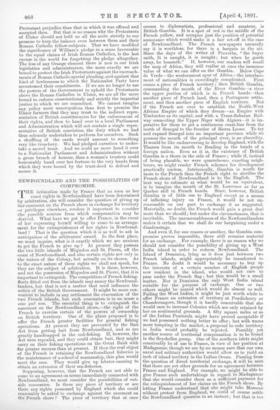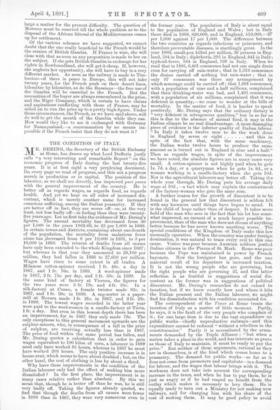NEWFOUNDLAND AND THE POSSIBILITIES OF COMPROMISE. T HE intimation made by
France that as soon as her exact rights in Newfoundland have been determined fly arbitration, she will consider the question of giving up iher easement on the French shore in exchange for territory -or privileges elsewhere, renders it important to consider the possible sources from which compensation may be .derived. What have we got to offer France, in the event of her expressing herself willing to come to an arrange- event for the extinguishment of her rights in Newfound- land? That is the question which it is as well to ask in anticipation of the arbitrators' award. In the first place, we must inquire, what is it exactly which we are anxious to get the French to give up ? At present they possess the two little islands of Miquelon and St. Pierre, off the -coast of Newfoundland, and also certain rights not only in the waters of the Colony, but actually on its shores. As to the exact nature of these rights we shall not speak, for they are the subject of arbitration. It is these, however, and not the possession of Miquelon and St. Pierre, that it is important to extinguish. The competition of French fishing- fleets fitted out from the islands may annoy the Newfound- landers, but that is not a matter that need influence the action of the British Government. It might be more con- venient to include in any settlement the evacuation of the two French islands, but such evacuation is in no. sense a sine eta non. The essential thing is to extinguish the easement on the Newfoundland shore,—the right of the French to exercise certain of the powers of ownership on British territory. One of the plans proposed is to offer the French greater facilities for general fishing operations. At present they are prevented by the Bait Act from getting bait from Newfoundland, and so are greatly handicapped in the cod-fishing. If, however, the Act were repealed, and they could obtain bait, they might carry on their fishing operations on the Great Bank with far greater success than at present. If then the real object .of the French in retaining the Newfoundland fisheries is the maintenance of a school of seamanship, this plan would meet the case. They would give up lobster-canning to obtain an extension of their sea-fisheries.
Supposing, however, that the French are not able to come to an agreement on terms immediately connected with Newfoundland, we must consider the possibilities of out- side concession. Is there any piece of territory or are there any rights possessed by England which she could reasonably be asked to exchange against the easement on the French shore ? The piece of territory that at once occurs to diplomatists, professional and amateur, is British Gambia. It is a spot of red in the middle of the French yellow, and occupies just the position of potential annoyance which would make it a fair set-off in the case of Newfoundland. The French newspapers naturally say it is worthless, for there is a bargain in the air. Since the days of the writer of Proverbs, "the buyer saith, It is naught, it is naught ; but when he goeth away, he boasteth." If, however, our readers will recall the map of Africa, they will realise at once the immense value of what we can offer on the Gambia. Below Cape de Verde—the westernmost spur of Africa—the interlace- ment of nationalities is exceedingly complicated. First comes a piece of French territory ; then British Gambia, commanding the mouth of the River Gambia—a river the upper portion of which is in French hands—then another piece of French land, then a Portuguese settle- ment, and then another piece of English territory. But if the French are ever to establish the North-West African Empire of which they dream—an Empire with Timbuctoo as its capital, and with a Trans-Saharan Rail- way connecting the Upper Niger with Algiers—it is im- perative for them to get a continuous coast-line from the north of Senegal to the frontier of Sierra Leone. To try and expand Senegal into an important province while we possess the mouth of the principal river, is an absurdity. It would be like endeavouring to develop England, with the Thames from its mouth to Reading in the 'lends of a foreign nation. Even as it is, the existence of British Gambia is a thorn in the side of France ; while if, instead of being placable, we were quarrelsome, exacting neigh- bours, we might render French schemes for development practically useless. Intrinsically, Gambia is worth far more to the French than the French right to sterilise the French shore of Newfoundland is to the English. The best way to estimate at what would be an equivalent, is to imagine the mouth of the St. Lawrence as far as Quebec still in French hands. Since, however, British Gambia is of little use to England except as a means of inflicting injury on France, it would be not un- reasonable on our part to exchange it as suggested. Materially, no doubt, the French would gain a great deal more than we should; but under the circumstances, that is inevitable. The unreasonableness of the Newfoundlanders makes it certain that we shall do our bargaining under a disadvantage.
And even if, for one reason or another, the Gambia com- promise proves impossible, there still remains material for an exchange. For example, there is no reason why we should not consider the possibility of giving up a West India island in order to redeem Newfoundland. The Island of Dominica, lying as it does just between two French islands, might appropriately be transferred to France. No doubt it would be necessary to buy up the interests of a certain number of English people now resident in the island, who would not care to pass under the French flag ; but this would be a small matter. Nor is Dominica the only West India island suitable for the purpose of exchange. One or two others might be named which would do almost as well. Failing the West Indies, it might be just worth while to offer France an extension of territory at Pondicherry or Chandernagore, though it is hardly conceivable that she would care to increase Colonies which are only retained by her on sentimental grounds. A fifty square miles or s`o of the Indian Peninsula might have proved acceptable if we had possessed nothing better to offer ; but with wares more tempting in the market, a proposal to cede territory in India would probably be rejected. Possibly yet another source of territorial compensation is to be found in the Seychelles group. One of the southern islets might conceivably be of use to France, in view of her position at Madagascar, though we are by no means sure that our own naval and military authorities would allow us to yield an inch of island territory in the Indian Ocean. Passing from the question of direct territorial exchange, it will be seen that there are yet other grounds for an agreement between France and England. For example, we might be able to give France such undertakings in regard to Madagascar that she would consider them as a sufficient payment for the relinquishment of her claims on the French shore. By letting France understand that she might take Morocco without protest from England, we could of course settle the Newfoundland question in an instant ; but that is too large a matter for the present difficulty. The question of Morocco must be reserved till the whole problem as to the disposal of the African littoral of the Mediterranean comes up for settlement.
Of the various schemes we have suggested, we cannot doubt that the one really beneficial to the French would be the cession of British Gambia, If France is wise, she will close with that as soon as any proposition is made to her on the subject. If she gets British Gambia in exchange for her rights in Newfoundland, she will get it cheap. If, however, she neglects her opportunity, she will have to buy in a very different market. As soon as the railway is made to Tim- buctoo—if there is peace in Europe, this will not take twenty years, for the French push on their desert lines, kilometre by kilometre, as do the Russians—the free use of the Gambia will be essential to the French. But the necessities of the buyer are always remembered in the price, and the Niger Company, which is certain to have claims and aspirations conflicting with those of France, may be relied on to run the price up to a pretty high figure. Under these circumstances, the French, as we have said above, will do well to get the mouth of the Gambia while they can. How would they like to see it exchanged with Germany for Namaqualand,—a consummation by no means im- possible if the French insist that they do not want it ?







































 Previous page
Previous page